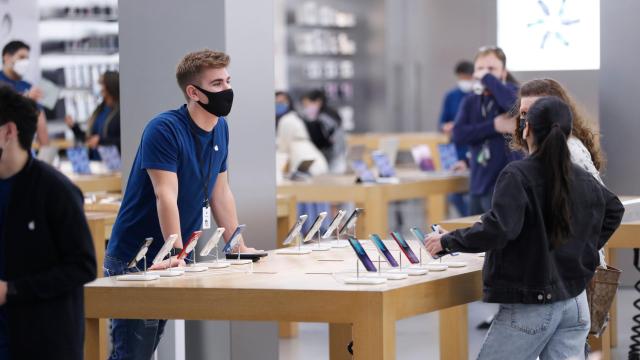Apple is the latest tech company to mull the state of the coronavirus pandemic and wearily shrug as to when it will finally ask workers to return to the office, according to multiple news reports.
Bloomberg reported that CEO Tim Cook sent a memo to staff on Wednesday informing them the company is “delaying the start of our hybrid work pilot to a date yet to be determined. Our offices remain open and many of our colleagues are coming in regularly, including our teams in Greater China and elsewhere.” Previously, Apple had asked workers to return to the office by February, although that date had already been pushed back multiple times (scrapped dates have included June, September, October, and January).
Cook’s memo cited “rising cases in many parts of the world and the emergence of a new strain of the virus,” referring to the still poorly understood Omicron variant of the virus, according to Bloomberg. He pleaded staff to get vaccinations and booster shots as “this is by far the best way to keep you and your community safe.” Apple employees will also be receiving a $US1,000 ($1,391) bonus intended to be used to upgrade their at-home work environments as they see fit, including staff at its retail locations.
Apple confirmed the decision to Bloomberg, the New York Times, and CNN Business. As CNN noted, earlier this week, Apple had closed some of its retail locations and brought back mask mandates at all others; the Times reported signs of outbreaks at Apple retail locations in Annapolis, Maryland; Miami; and Ottowa.
Cook stated in the memo employees will get at least four weeks of heads up before anyone will be required to return to the office; when they are required, many staff will be on a split schedule in which they only need to show up three days a week.
Return-to-office dates have basically become the stuff of futurism at a large number of companies. The New York Times recently reported that companies that have announced postponements include DocuSign, Ford, CNN, Google, Facebook (which won’t require staff to return at all), and Lyft, with the latter saying mandatory office time wouldn’t be re-implemented until at least 2023. Surveys have shown that workers would, in general, very much like not to be required to return to the office, while many organisations have repeatedly pushed back their dates thanks to the unpredictable twists and turns of the global pandemic.
The emergence of the highly transmissible Delta variant earlier this year was a major curveball, raising the prospect that vaccination rates were not yet high enough to adequately protect employees or their loved ones from the possibility of an office outbreak. Now there’s the Omicron variant, which studies have indicated may be able to bypass some of the protections of existing vaccines, at least without a booster, and result in increased breakthrough infections. (It’s important to note that the vaccines are still extremely effective at preventing severe illness from the coronavirus. Early research indicates that while Omicron may be able to sneak its way past antibodies in vaccinated people, it doesn’t have any tricks up its sleeve with T cells, the immune system’s second layer of defence.)
“The reality is, folks are learning that sharing the intention of their return plan is more important than sharing the plan itself. … The average CEO has very little command over the state and progress of a global pandemic,” Zach Dunn, the co-founder of office space management firm Robin, told the Times. “It feels like in a moment of crisis they should be showing leadership by sharing a clear vision for what they expect, but that’s backfired for most folks.”
“The only companies being dishonest are the ones giving employees certainty,” Stanford professor Nicholas Bloom, an adviser to many CEOs, told the Times. “As a parent, you can hide stuff from your kids, but as a CEO you can’t do that to adult employees who read the news.”
Apple didn’t immediately respond to a request for comment from Gizmodo, but we’ll update this story if we hear back.
MORE: Early Data on Omicron: There’s Good News and There’s Bad News
Editor’s Note: Release dates within this article are based in the U.S., but will be updated with local Australian dates as soon as we know more.
